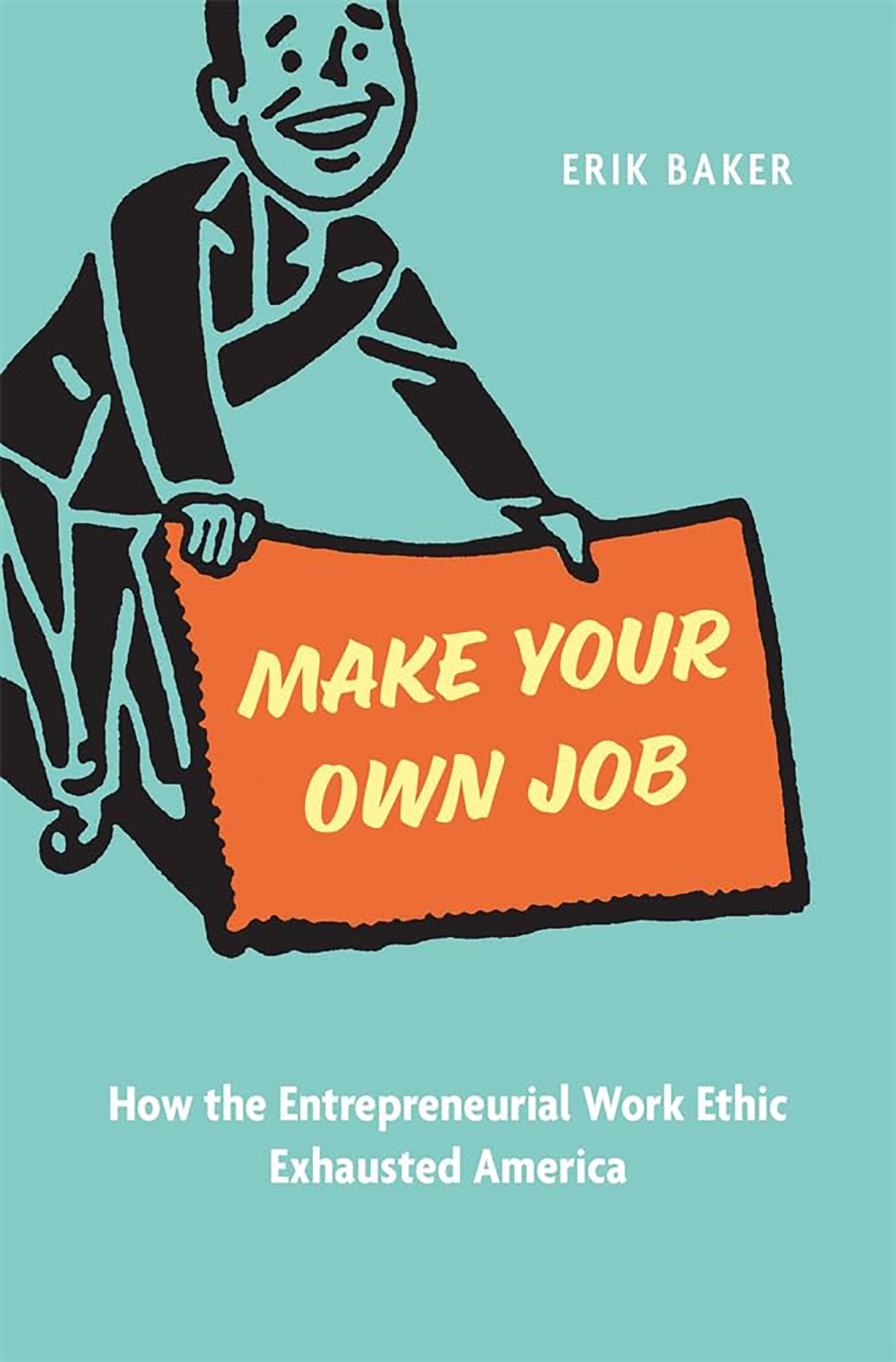You, too, can never, ever relax

Illustration by Ben Sanders/Ikon Images
In ‘Make Your Own Job,’ Erik Baker explores how entrepreneurialism has altered Americans’ relationship with work
There are lots of entrepreneurs these days. Founders of businesses, of course, are entrepreneurs, and so are the managers below them. Ride-share drivers, influencers, life coaches: entrepreneurs. There are self-styled intrapreneurs, solopreneurs, and sidepreneurs, all of whom embody the ideals of entrepreneurialism in their own unique ways.
In “Make Your Own Job,” history of science lecturer Erik Baker explores the American embrace of entrepreneurialism and why, for all the popularity of the approach, it can feel so exhausting.
Baker got interested in the topic as his friends graduated from college, landed well-paying corporate jobs, and quickly became miserable. One told him that she felt like Natalie Portman’s character in the sci-fi movie “Annihilation,” who descends into a black pit and discovers a sinister doppelganger. There was something interesting, Baker thought, about how work changes our relationships with ourselves.

In “Make Your Own Job,” Baker traces America’s enthusiasm for entrepreneurialism to the end of the 19th century. It was the conclusion of the first era of American industrialization, and the rapid electrification of manufacturing plants, among other developments, depressed demand for factory labor. After high levels of job growth throughout the 1800s, Baker writes, “The rate of employment growth in manufacturing began to taper off in 1890 and became negative around 1920.”
Social scientists called this job loss “structural” or “technological” unemployment: “Unemployment that was not the product of transient, cyclical crises,” Baker writes, “but was rather a side effect of irreversible changes to the technical structure of American industry.”
In response, Americans shifted from an industrious work ethic to an entrepreneurial one infused with ideas of personal transcendence in New Thought. Instead of focusing on the inherent value of hard work, the new ethic emphasized that hard work wasn’t enough; one should apply one’s own unique skills to the task at hand with ceaseless ambition. A cohort of success writers, across racial and gender demographics, began preaching a similar ideology: “Make your own job.”
Baker chronicles how entrepreneurialism, and its very definition, expanded over time. In the early 1900s, orthodox management styles that focused primarily on production processes gave way to “entrepreneurial management,” which focused not on merely managing employees, but inspiring them. At Harvard Business School, among other institutions, management intellectuals preached the importance of leaders who made workers “not truly feel like subordinates,” in Baker’s words, “but like members of a team or a family, or even a revolutionary cadre.”
The new ethic emphasized that hard work wasn’t enough; one should apply one’s own unique skills to the task at hand with ceaseless ambition.
In Baker’s narrative, entrepreneurial fervor tends to increase during times of economic stress. During the Great Depression, “odd jobs” became something more. Doing freelance work was not just a way to make a few dollars, but, as the authors of the 1933 book “Make Your Own Job: Opportunities in Unusual Vocations” put it, a way for someone to build “a small one-man business of his own.” Women over 40, who often faced hiring discrimination, could embrace this individualistic ethic. “We Are Forty and We Did Get Jobs,” boasted the title of one self-help book aimed at women.
Baker uses these references to self-help literature to illustrate shifts in national sentiment. Authors such as Napoleon Hill, whose 1937 book “Think and Grow Rich” remains popular to this day, encouraged readers to turn work into a calling that relied on specialized knowledge, creativity, and self-promotion. “With the changed conditions ushered in by the world economic collapse,” Hill wrote, “came also the need for newer and better ways of marketing personal services.”
By the mid-20th century, Baker writes, interest in entrepreneurialism had surged into non-economic fields, with Abraham Maslow and other psychologists becoming cheerleaders. “The most valuable 100 people to bring into a deteriorating society,” Maslow wrote, “would be not 100 chemists, or politicians, or professors, or engineers, but rather 100 entrepreneurs.”
It also became a catch-all explanation for a lack of economic development. As the fate of American cities sharply diverged with the relocation and shuttering of factories during the 1960s, certain experts blamed increasing unemployment in places like Detroit on a lack of entrepreneurial spirit.
With these mid-century changes, Baker argues, almost everyone could think of themselves as entrepreneurs: leaders of companies, managers who could inspire their co-workers, employees who could take more initiative, and even unemployed people looking for work. “It was far from obvious that high-tech corporate executives … were doing exactly the same sort of thing as a laid-off Black worker taking adult education classes, or a shopkeeper in India contemplating a change in management methods,” Baker writes. “But midcentury thinking about entrepreneurship and development depended upon precisely this equivalence.”
In the 1970s and 1980s, it wasn’t so much a scarcity of work that drew people toward entrepreneurialism, Baker argues, but a scarcity of jobs people found meaningful. This yearning was filled in part by leaders who encouraged employees to see their work as a source of enlightenment. Apple’s Steve Jobs would state that competing with IBM was not an economic imperative but a moral one — lest IBM win and stifle innovation. Ralph Nader’s Center for Study of Responsive Law was supported by young, ambitious employees. When asked how many hours he expected them to work, Nader deadpanned: “The ideal is 100.”
The popularity of entrepreneurialism continues to this day, Baker says, in part because it glorifies a perpetual state of risk. With fears of technological job displacement rising along with the number of people in freelance or temporary roles, more people can consider themselves the center of an entrepreneurial operation — even if the operation is just themselves.
Reading “Make Your Own Job,” one can see why Baker’s friend found herself experiencing science-fiction levels of misery. When failure always feels tangible, it’s hard to relax. For Baker, entrepreneurialism requires that everyone keep a solitary eye on the future — and remain anxious in the present.




